Classics and the Western Canon discussion
Divine Comedy, Dante
>
Paradiso 7: Redemption
date newest »
newest »
 newest »
newest »
 For Paradiso Canto VII image from the Bodleian Library 14th century manuscript try this:
For Paradiso Canto VII image from the Bodleian Library 14th century manuscript try this:http://www.bodley.ox.ac.uk/dept/scwms...
Paradiso Canto VII. "Dante listens to Beatrice."
If you have been following the images from this manuscript, you’ll probably feel as if you have seen this one before. It is very similar to some from Cantos IV and V. Use the link below to compare thumbprint images. The cumulative effect is to reinforce the theme of Beatrice teaching Dante in these cantos and of their discussions of subjects profound.
http://www.bodley.ox.ac.uk/dept/scwms...
 http://www.worldofdante.org/media/ima...
http://www.worldofdante.org/media/ima...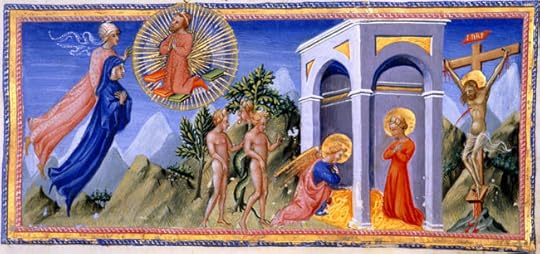
Giovanni di Paolo: Paradiso Canto 7.40. “Justinian Explains Christ's Death as God's Just Vengeance.” c.1450. Manuscript illumination. Yates Thompson 36. British Library.
Try contrasting the Justinian (Dante) explanation of the crucifixion with that of other theologians through the ages, even such contemporary (and sometimes controversial) ones as John Crossan and Marcus Borg.
http://etcweb.princeton.edu/dante/pdp/ -- to retrieve the desired portion of Commedia.
 http://www.lockportstreetgallery.com/...
http://www.lockportstreetgallery.com/...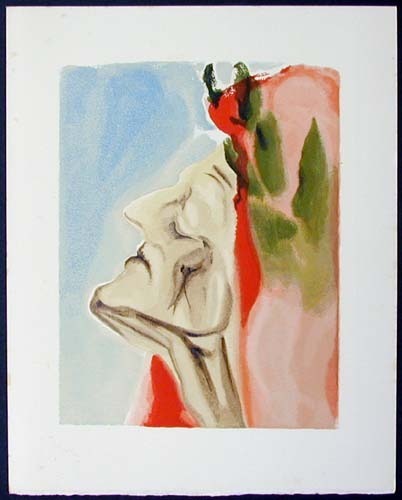
Salvador Dali: Paradiso Canto 7. “Dante in Doubt.”
My reaction: powerful imagery.
 http://etcweb.princeton.edu/dante/pdp...
http://etcweb.princeton.edu/dante/pdp...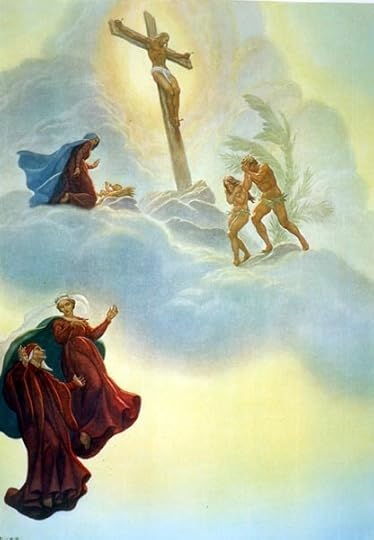
Amos Nattini, Paradiso Canto VII. "Osanna, sanctus Deus sabaoth, “ (first line).
I see that Dante is progressing. Although still hestitant, at least he's encouraging himself to speak up.
"Speak, speak to your Lady," I began to exclaim
Within myself, but wavering. (Para. 7.9)
"Speak, speak to your Lady," I began to exclaim
Within myself, but wavering. (Para. 7.9)
 http://www.worldofdante.org/media/ima...
http://www.worldofdante.org/media/ima...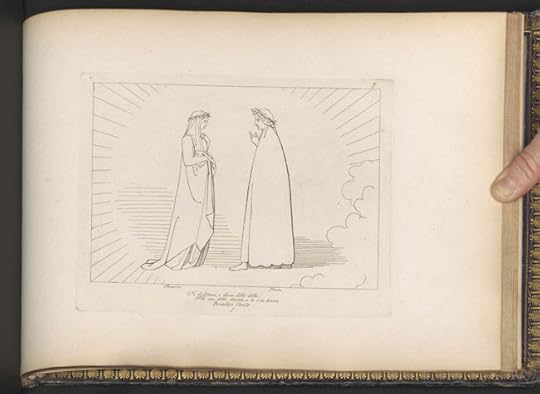
John Flaxman: Paradiso Canto VII.1. “Dante Urges Himself to Query to Beatrice.” 1793. Engraving.
Thank you, Lily!
Methinks that one is well-titled.
Methinks that one is well-titled.
Lily wrote: "http://www.lockportstreetgallery.com/...
Salvador Dali: Paradiso Canto 7. “Dante in Doubt.”
My reaction: powerful imagery."
Agreed.
What appears to be an open wound or scar on his cheek.... Self-inflicted?
The emaciated look of Dante...as though he has long been starving..(For certitude? For the truth?)
And Dante's eyes are still closed. When will he finally SEE the Truth?
The total emotionally-tinged contrast between the cool, serene, peaceful blue sky and the heat of the various ---and multiple (like multiple theories or multiple doubts)-- reds which seem to almost flow over Dante's head.
Dante's head here seems to be held at an angle very similar to that of Christ's at the point at which Jesus looked heavenward and cried out, "My God, my God, why have you forsaken me?"
That would suggest that Dante full of doubt is full of anguish.
To me, there seemed to be a suggestion -- almost subliminal - of the blood which flowed down Christ's head as he hung on the cross.
That flowing blood would have come primarily from the crown of thorns which the Romas had placed on his head. And indeed, there is a suggestion of a such a crown around Dante's brow.
Dante's crown, however, appears to be composed of leaves. Probably, I thought, laurel leaves.
Wikipedia says that Dante was often represented wearing a crown of laurel leaves.
I read online that laurel leaves are bitter tasting and are thought to be conducive to Seeing. Supposedly, Christians put forward the story that the Sybil at Delphi chewed laurel leaves to See the truth... Perhaps Dali is suggesting a little of that in his painting. (And we would recall Virgil and the Aenid.) Also, the Sybil wrote answers on leaves that would fly about with the slighest wind. Dali might be incorporating that idea also...Dante's doubts flying about within his mind?
Laurel leaves can symbolize:
Glory
Victory
Nobility
Immortality
Intellectual superiority
Second Sight (the gift of prophecy)
Recognition (renown) of High Achievement
Long-term Vision (“big picture” understandings)
I read online that they sometimes symbolize divinity.
Yet this is a portrayal of Dante struggling with doubt.
And as I looked back and looked back on this picture it began to seem certain to me that there wasn't only the suggestion of a laurel wreath, or, moving back a little further to the suggestion of a Christ-like wreath of thorns ... which I DO believe is symbolically there below the leaves.
It looks to me as though there is ALSO the faintest suggestion that the topmost two leaves or thorns...are horns...horns such as were often depicted on representations of the devil.
And I thought that was there. And that, on some level, it made me feel doubtful of Dante. Does the Devil still have a small hold on him? Will Dante, in the end, truly be saved?
Salvador Dali: Paradiso Canto 7. “Dante in Doubt.”
My reaction: powerful imagery."
Agreed.
What appears to be an open wound or scar on his cheek.... Self-inflicted?
The emaciated look of Dante...as though he has long been starving..(For certitude? For the truth?)
And Dante's eyes are still closed. When will he finally SEE the Truth?
The total emotionally-tinged contrast between the cool, serene, peaceful blue sky and the heat of the various ---and multiple (like multiple theories or multiple doubts)-- reds which seem to almost flow over Dante's head.
Dante's head here seems to be held at an angle very similar to that of Christ's at the point at which Jesus looked heavenward and cried out, "My God, my God, why have you forsaken me?"
That would suggest that Dante full of doubt is full of anguish.
To me, there seemed to be a suggestion -- almost subliminal - of the blood which flowed down Christ's head as he hung on the cross.
That flowing blood would have come primarily from the crown of thorns which the Romas had placed on his head. And indeed, there is a suggestion of a such a crown around Dante's brow.
Dante's crown, however, appears to be composed of leaves. Probably, I thought, laurel leaves.
Wikipedia says that Dante was often represented wearing a crown of laurel leaves.
I read online that laurel leaves are bitter tasting and are thought to be conducive to Seeing. Supposedly, Christians put forward the story that the Sybil at Delphi chewed laurel leaves to See the truth... Perhaps Dali is suggesting a little of that in his painting. (And we would recall Virgil and the Aenid.) Also, the Sybil wrote answers on leaves that would fly about with the slighest wind. Dali might be incorporating that idea also...Dante's doubts flying about within his mind?
Laurel leaves can symbolize:
Glory
Victory
Nobility
Immortality
Intellectual superiority
Second Sight (the gift of prophecy)
Recognition (renown) of High Achievement
Long-term Vision (“big picture” understandings)
I read online that they sometimes symbolize divinity.
Yet this is a portrayal of Dante struggling with doubt.
And as I looked back and looked back on this picture it began to seem certain to me that there wasn't only the suggestion of a laurel wreath, or, moving back a little further to the suggestion of a Christ-like wreath of thorns ... which I DO believe is symbolically there below the leaves.
It looks to me as though there is ALSO the faintest suggestion that the topmost two leaves or thorns...are horns...horns such as were often depicted on representations of the devil.
And I thought that was there. And that, on some level, it made me feel doubtful of Dante. Does the Devil still have a small hold on him? Will Dante, in the end, truly be saved?
 Wow, you had fun with that, Adelle, although "fun" certainly isn't the right word to capture your explorations.
Wow, you had fun with that, Adelle, although "fun" certainly isn't the right word to capture your explorations.There is a quieter sequence of images that I have found it useful to allay the seemingly painful doubt in Dali's image of Dante -- all the images again and again of Dante discoursing with Beatrice in the Bodleian manuscript. I get a sense that the conversations, the quest, the investigations, the responses, the journey, just goes on and yet repeats and repeats -- usually moving forward, sometimes circling on self.
By the way, don't forget that Moses is another figure frequently depicted with horns.
 (Clearer image:) http://www.worldofdante.org/media/ima...
(Clearer image:) http://www.worldofdante.org/media/ima...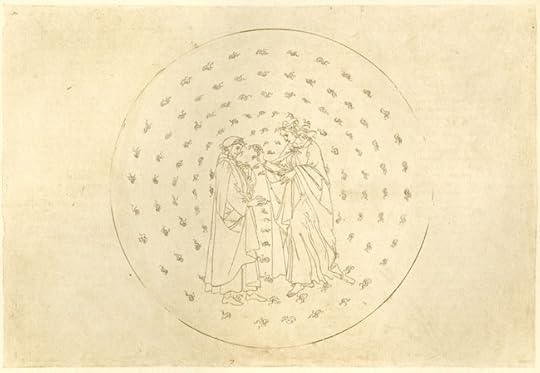
Sandro Botticelli: Paradiso Canto VII.1. “Second Planetary Sphere (Heaven of Mercury); Beatrice Introduces Dante to a Number of Complex Issues Concerning Divine Justice, Original Sin and Redemption Through Christ's Death.” c.1480 - c.1495. Drawing.
Lily wrote: "Wow, you had fun with that, Adelle, although "fun" certainly isn't the right word to capture your explorations.
LOL, I just calls 'em as I see 'em, Lily!
And yes, I had fun.
LOL, I just calls 'em as I see 'em, Lily!
And yes, I had fun.
Mmmm. 2 or 3 days back there was a link to an article about Dali. I couldn't read it in little print... And now that I'm back on the computer I can't recall where it was. Does anyone happen to remember? Thanks.
 Adelle wrote: "Mmmm. 2 or 3 days back there was a link to an article about Dali. I couldn't read it in little print... And now that I'm back on the computer I can't recall where it was. Does anyone hap..."
Adelle wrote: "Mmmm. 2 or 3 days back there was a link to an article about Dali. I couldn't read it in little print... And now that I'm back on the computer I can't recall where it was. Does anyone hap..."http://dali.parkwestgallery.com/divin...
If this is the one you are looking for, I had put it under background/resources. But, given what I have been putting into threads recently, who would have considered looking there? LOL!
That was it. (I looked through the Cantos. I didn't check background.) Thanks, Lily.
 Adelle wrote: "That was it. (I looked through the Cantos. I didn't check background.) Thanks, Lily."
Adelle wrote: "That was it. (I looked through the Cantos. I didn't check background.) Thanks, Lily."Before going out tonight, I read a little bit about Dali from his Wiki article and a link to one his major works. Strange guy, strange upbringing -- shows up in his work. Brought to the canvas insights some of us probably wouldn't dare make, at least outside our heads. Maybe someday I'll browse a biography. I was wondering if something in particular was going on in his life at the time he did the Commedia sequence. Didn't find the answer to my question.
 Dante doubts the righteousness of the destruction of Jerusalem - and gets rebuked by Beatrice.
Dante doubts the righteousness of the destruction of Jerusalem - and gets rebuked by Beatrice. It's often assumed Beatrices argument includes all the Christian outrages against the Jews (at least till Dante's time, though Beatrice should have know what was yet to come). I don't have much sympathy for Beatrice, but I'm not so sure the assumption is correct.
Still, this canto does not seem to do much for the reputation of scholasticism.
 Wendelman wrote: "...at least till Dante's time, though Beatrice should have know what was yet to come..."
Wendelman wrote: "...at least till Dante's time, though Beatrice should have know what was yet to come..."Why presume Beatrice should know the future? Has Dante told us such?
I've been developing the feeling that the entire Commedia has been exposing some of the (faulty) logic of scholasticism to modern readers. May I ask what specific example struck you for this canto? (Incidentally, I'm not enough of a scholar of scholasticism to be able to pull out specifics myself -- it is just those attempts to make "logic" prove things that aren't necessarily provable by logic or dialectics alone that I associate with its shortcomings.)
 Lily wrote: Why presume Beatrice should know the future? Has Dante told us such?
Lily wrote: Why presume Beatrice should know the future? Has Dante told us such?That was speculation on my part. But I just picked up the story in canto 15 (my library is sending urgent messages), which has some info on the subject.
I'm not qualified nor interested enough to discuss scholasticism. It's just that these canto's give me a certain feeling of malaise - I can relate to religion on an emotional level, but not to the doctores ecclesiae.
 Wendelman wrote: "...It's just that these canto's give me a certain feeling of malaise..."
Wendelman wrote: "...It's just that these canto's give me a certain feeling of malaise..."LOL. I'm finding it rather delightful that such may be part of Dante's gift to the centuries that have followed him. Who else makes those medieval thought paths so accessible in, at times, almost eerie ways? Is it like watching the human mind travel the paths to perhaps the almost excessive empiricism that pervades (academic, professional, scientific?) thought today? Or, what does it say to the need and use of fantasy by humankind to understand and live into the world inhabited? Fantasy becomes a mode of exploration of the possible? Some have said that Christianity's insistence on self-examination has been one of the factors leading to its role in the modern world and to the very existence of the age of Enlightenment and the scientific and technological ages that have followed. (A random thought -- is reading Dante like experiencing the communal mind in adolescence on its journey to maturity?)
"I can relate to religion on an emotional level, but not to the doctores ecclesiae."
I once made a pledge (to myself) to keep my religious learning on a par with my scientific training. I have not found it possible to keep that pledge, but the vain attempts have certainly enriched my journey.
 My understanding is that Scholaticism arose as a responce to Aristotelianism. The rediscovery of the major works of Aristotle had cause an intellectual stir in the earlier Middle Ages because of their evident high quality and their incompatibility with Christianity. The Scholastics wanted to show that Aristotelian methods and quality could be applied successfully to Christian theology.
My understanding is that Scholaticism arose as a responce to Aristotelianism. The rediscovery of the major works of Aristotle had cause an intellectual stir in the earlier Middle Ages because of their evident high quality and their incompatibility with Christianity. The Scholastics wanted to show that Aristotelian methods and quality could be applied successfully to Christian theology.
 Roger wrote: "...their incompatibility with Christianity...."
Roger wrote: "...their incompatibility with Christianity...."Roger -- can you say more or point to a decent lay person's discussion? (I have only some vague sense of the challenge re-discovery of Greek philosophy had on Western thought [let alone what its absence had done], beyond that it was deeply significant.)
 Lily wrote: "Roger wrote: "...their incompatibility with Christianity...."
Lily wrote: "Roger wrote: "...their incompatibility with Christianity...."Roger -- can you say more or point to a decent lay person's discussion? (I have only some vague sense of the challenge re-discovery o..."
Aristotle thought that the Universe was eternal. This gave St. Thomas a good deal of trouble, since the Bible clearly teaches that the Universe was created at a point in time. He resolves it with minimum damage by claiming that natural reason actually cannot resolve the issue, and Aristotle came down on the wrong side of it by chance.
Aristotle also attaches no importance to the immortality of the soul, though I forget how St. Thomas resolved that one.
 Roger wrote: "...and Aristotle came down on the wrong side of it by chance..."
Roger wrote: "...and Aristotle came down on the wrong side of it by chance..."According to St. Thomas? Or according to "the Big Bang" theory?
Thank you for your entire response, Roger. You gave me several points to push against other readings -- although not necessarily in the short term.
 Lily wrote: "Roger wrote: "...and Aristotle came down on the wrong side of it by chance..."
Lily wrote: "Roger wrote: "...and Aristotle came down on the wrong side of it by chance..."According to St. Thomas? Or according to "the Big Bang" theory?
Thank you for your entire response, Roger. You gave..."
St. Thomas.
 I was indeed thinking of scholasticism as an attempt to rationalise belief. The formulation of unchangeable truths, recognized by religion as well as science. However, the stains on its reputation have more to do with sophism, reasoning divorced from all experience.
I was indeed thinking of scholasticism as an attempt to rationalise belief. The formulation of unchangeable truths, recognized by religion as well as science. However, the stains on its reputation have more to do with sophism, reasoning divorced from all experience.The question how many angels fit on the tip of a needle is the classic example (http://en.wikipedia.org/wiki/How_many...). And I just read about Dante's friend Petrus Damianus (canto 21) who was, it seems, much occupied by the problem whether God can restore a woman's virginity (or more in general alter the past).



"Of man's first disobedience, and the fruit
Of that forbidden tree, whose mortal taste
Brought death into the world, and all our woe,
With loss of Eden, till one greater Man
Restore us, and regain the blissful seat."
Paradise Lost 1.1-5
Hollander's outline:
MERCURY
1-3 Justinian's double-tongued canto opening
4-6 his "double light"
7-9 the dancing disappearance of the "Mercurians"
10-12 Dante's question and eagerness to share it with Beatrice
13-18 he holds it back, yet she divines his thoughts
19-24 Beatrice reveals his question ("how can a just vendetta be justly punished?") and prepares to answer
(1) Beatrice's response to Dante's first question
25-27 Adam, not reining in his will, took us down with him
28-33 thus the human race was "infirm" until the Incarnation
34-39 the flesh of Christ was both pure (like new-made Adam's) and, because flesh after
original sin is what it is, impure in itself;
40-45 if one pays attention to Christ's flesh as flesh, the pain of the cross was justly felt,
46-48 thus a single act had diverse effects, pleasing God and the Jews (for different reasons),
earthquake and the opening of heaven the differing signs
49-51 and thus let it no longer be difficult for you to acknowledge that a just vengeance (the
killing of Jesus) was itself avenged justly (by Titus)
(2) Dante's second doubt and Beatrice's response
52-57 I see you are again confused; what you want to know is "Why did God decide to save
humankind by agency of the death of Jesus and not in some other way?"
58-63 This is hidden, brother, from those not brought up in the flame of divine love
64-78 man's privileged position in the universe
79-81 the Fall: man lost most of that privilege
82-93 only two ways to recover his position: (1) he himself had to repay or (2) God had to pardon him
94-105 since he had no means to accomplish the first of these, it remained to God to ransom him
106-120 the Incarnation and death of Jesus
(3) Dante's third doubt; Beatrice's resolution of it
121-123 Anticipating a problem that Dante may derive from her previous words,
Beatrice resolves yet another doubt:
124-129 you say, "I see four elements; they, created by God, in fact die and should not do so";
130-138 angels and heavens fully formed by God
139-141 souls of beasts and plants drawn forth by the stars
142-144 but your life is breathed into you directly by God,
145-148 hence you are immortal (as are Adam and Eve).